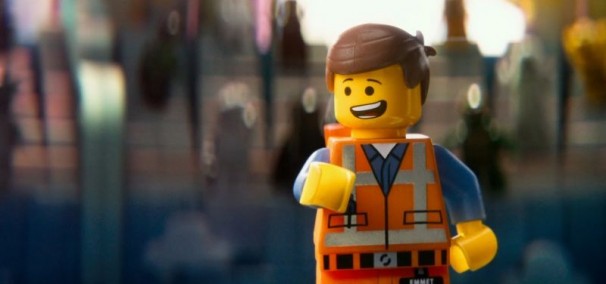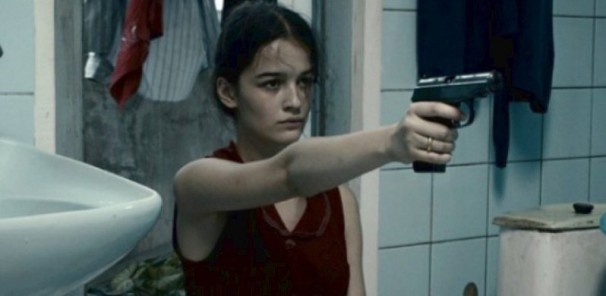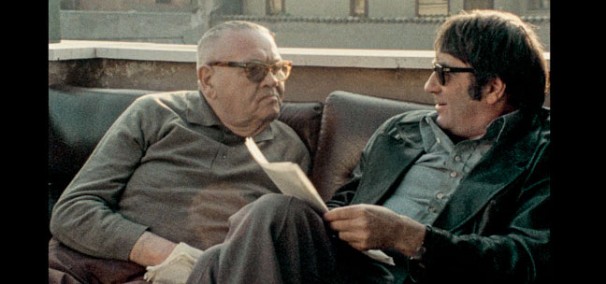It’s pure coincidence that this is one of the best opening weeks for new movies in Los Angeles in recent memory. Not only are “The Lego Movie,” “In Bloom” and “The Last of the Unjust” all essential viewing—along with “A Field in England,” the latest brilliant black comedy from director Ben Wheatley and writer Amy Jump combining the English Civil War and hallucinogens (at Cinefamily and Downtown Independent), and the rollicking festival hit from Paraguay, “7 Boxes” (at Downtown Independent and Laemmle Playhouse 7 in Pasadena)—they collectively mark out five distinct points on a cinema compass, taking the viewer in entirely different zones and sensibilities. Lucky us.
Forget Disney, Pixar or any of Hollywood’s other animation factories. The real magic is happening with the astonishing team of co-writers/directors Phil Lord and Christopher Miller, who cement the budding genius suggested in “Cloudy with a Chance of Meatballs” franchise with the season’s most surprising triumph, “The Lego Movie.” Recently at REDCAT, Thom Andersen screened a fresh cut of his essay movie, “Red Hollywood,” which examines the blacklist from an entirely original perspective. Those late blacklisted writers, such as Paul Gallico, would have chuckled at what Lord and Miller have created here—a devilishly clever smackdown of capitalist consumer society and its associated conformity, along with the evils of corporate fascism and its power to seduce the masses. This is one of those rare big studio Trojan Horse movies: In the guise of what would seem to be a feature promo for the Lego brand, the movie smuggles in some of the most radical ideas in any recent Hollywood movie, and does so with whip-smart writing, an actual screenplay, unexpected depths of emotion, breakneck pacing and the kind of wit that almost noone in the studio system can manage anymore. The story’s payoff may suggest that kids are the target audience, but don’t be fooled: “The Lego Movie” and its deliberately plastic, candy-colored look may tickle children’s eyes, but it’s really speaking to their parents, and everyone who feels suckered by The System. (Citywide)
Like a bomb triggered to go off, “In Bloom” builds in the viewer’s gut, a drama coiled to attack. Something is happening in the filmmaking world of Georgia, which hasn’t previously qualified as even a backwater, and this movie is some kind of ultimate statement by writer-director partners Nana Ekvtimishvili and Simon Gross (she’s Georgian, he’s German). Its triumph exactly a year ago at the Berlin Film Festival was a bolt out of the blue, with a finely chiseled narrative of ‘tween pals Eka (Lika Babluani) and Natia (Mariam Bokeria) trying to keep the wolves of the 1992 Georgian civil war away from their previously peaceful Tblisi doorsteps. But the movie shows how impossible this is, and that wolves will have their way. The childhood innocence in the eyes of Babluani and Bokeria melts away as they’re forced to make terrible choices, the bubble of girlhood punctured by huge social forces. The movie never, ever makes a wrong move, and many sequences are as good as anything in recent cinema. Where did this come from? is quickly replaced by another question: When will we get more of it? (Laemmle Music Hall in Beverly Hills and Laemmle Playhouse 7 in Pasadena)
It might seem impossible that documentary maker Claude Lanzmann hadn’t already made his complete statement on the Holocaust, given that Lanzmann’s “Shoah” is arguably the definitive film on the central tragedy of the 20th century. But Lanzmann wasn’t done when he completed “Shoah.” His unfinished business included hours of interview footage with Benjamin Murmelstein, the last president of the Theresienstadt Jewish Council, and the last rabbi to collaborate with the Nazis during World War II. What was going on inside Murmelstein’s head to engage with this evil, what was his sense of the realities of the impossible situation he found himself trying to negotiate, always with the aim of survival above all costs—even if those costs was some kind of moral scarlet letter that would tag him for the rest of his life? Or put another way, how did Murmelstein live with himself, having to collaborate with no less than Adolf Eichmann? Lanzmann caught up with Murmelstein in Rome in 1975, face to face with the last surviving Jewish Elder of the Nazi era. He’s a masterful interviewer, drawing out a torrent of memories and detailed accounts from an incredibly verbal Murmelstein, who seems to be at peace with his actions. Lanzmann’s newly shot material, showing him walking through the ruins of Theresienstadt, brings more ghosts to life, completing his “Shoah” epic in this confrontation with the ultimate moral gray zone. (Laemmle Royal in West Los Angeles and Laemmle Town Center 5 in Encino)
Robert Koehler, a film critic for Film Comment, Cinema Scope, IndieWire and Cineaste, blogs about movies on arts·meme.



